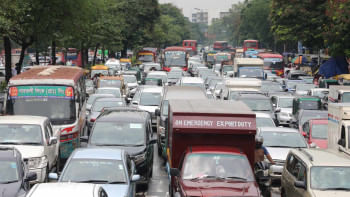Who will answer for Nusraat Faria’s detention?

On the bright side, the actress Nusrat Faria has secured bail, and been released, less than 48 hours after being arrested in relation to allegations of attempted murder, connected to the killing of a protestor in the July Uprising.
Did good sense triumph? Or was it an outrageous travesty? The comments on social media suggest that most people feel it was clearly the latter. And these comments all centre around the same questions.
First, why did the police arrest Faria -- when the most modest of inquiries by them would have indicated that she was out of the country and could not have been involved in the acts she was alleged to have committed?
Second, why did the public prosecutor demand that she be refused bail?
Third, why did the magistrate concerned refuse her bail and send her to Kashempur?
Fourth, why could government officials not find a way to intervene without depriving Faria of her liberty for 48 hours?
Some may argue that 48 hours is very little compared to the days and months of incarceration faced by many others who are falsely accused of similar allegations.
But whether 48, or 480, or 4,800, detaining a person without proper cause, is clearly a violation of her fundamental rights to personal liberty.
Who will hold accountable the police officer, the prosecutor and the magistrate involved? Will there be disciplinary actions against them ? Will any of them apologise? Will there be any reflection by the members of the interim government (advisers and special assistants) of their actions or inaction in this case and other cases -- that their role needs to be more than wringing the hands and deflecting responsibility onto others? Will our Supreme Court take suo motu action to discipline the magistrate or to lay down guidance for future action, or will it investigate allegations of such arbitrary decisions being taken in an array of cases?
Discussions on constitutional and judicial reform will ring hollow and bear no meaning if we do not see actions to demonstrate reforms now.
This entail taking some difficult steps -- such as requiring those in the interim government, who have been known as champions of human rights, to step forward and take collective responsibility for these actions and to prioritise the justice process for the victims of July.
It also means that they need to take urgent measures to stop injustices in the name of July, to identify those who are instigating these false cases, in pursuit of their own private vendettas, or for private gain, or out of sheer misogyny and enmity against individuals.
And, it is time for citizens to stand up and say "not in our name". Faria's arrest catalysed public anger and outrage, as did the implication of Iresh Zaker a few days ago. But there are many non-celebrities who are also caught up in such cases – and it is essential that we the public demand that the government prioritise processes for ensuring truth, justice, accountability and reparations for the victims of July.
Barrister Sara Hossain is an advocate at Supreme Court of Bangladesh.

 For all latest news, follow The Daily Star's Google News channel.
For all latest news, follow The Daily Star's Google News channel. 







Comments